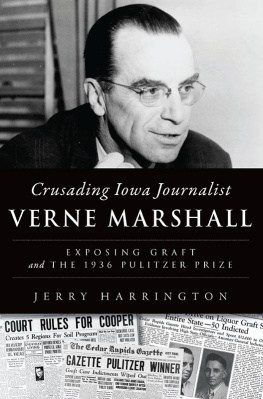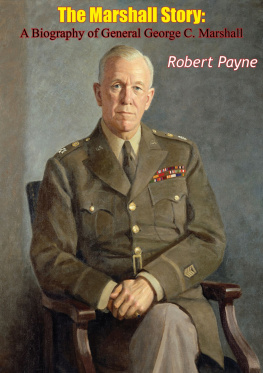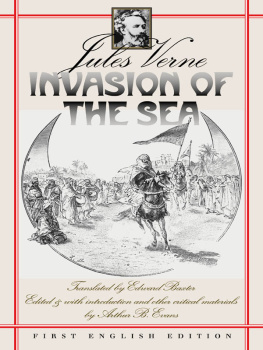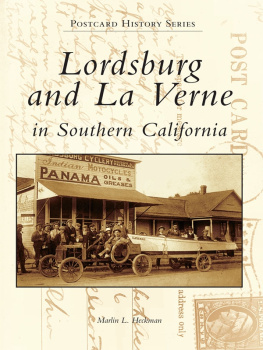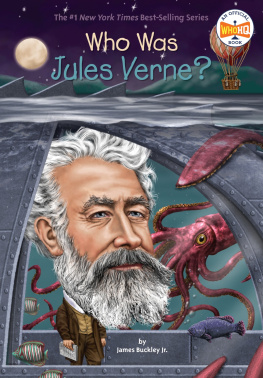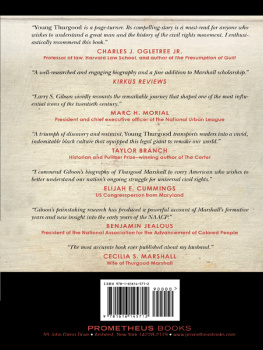


Published by The History Press
Charleston, SC
www.historypress.net
Copyright 2017 by Jerry Harrington
All rights reserved
Front cover, top: Verne Marshall. Courtesy of the State Historical Society of Iowa.
First published 2017
e-book edition 2017
ISBN 978.1.43965.919.9
Library of Congress Control Number: 2016948312
print edition ISBN 978.1.46713.597.9
Notice: The information in this book is true and complete to the best of our knowledge. It is offered without guarantee on the part of the author or The History Press. The author and The History Press disclaim all liability in connection with the use of this book.
All rights reserved. No part of this book may be reproduced or transmitted in any form whatsoever without prior written permission from the publisher except in the case of brief quotations embodied in critical articles and reviews.
To my wife, Leslie, who is my lifes treasure.
I cherish the honor and responsibility that go with an editorship. I ruin no careers that deserve protection, protect no careers that deserve ruin. When I throw the hooks into anyone, they know theyve been hooked and the reason. And Ive never thrown hooks whose throwing did not serve the public weal.
Verne Marshall in letter to Earl Hall, editor of the
Mason City Globe Gazette, December 24, 1930
I think it is a newspaper mans job to go after any dishonest public official who is pretending to serve the public, regardless of who it is. And when he gets the news he should print it, regardless of how much it costs.
Verne Marshall, testimony in Sioux City, October 9, 1935
CONTENTS
PROLOGUE
THE MEETING
By 1935, Iowa governor Clyde Herring had grappled with crisis after crisis in his more than two years on the job. Elected as a Democrat in the depths of the Great Depression, Herring assumed office in a rural state suffering from high unemployment and farm prices well below the cost of production. The federal channeling of jobs, money and agricultural programs into Iowa through President Franklin Roosevelts New Deal had certainly helped, but times remained tough in 1935. Job lines were still long, and farmers still feared foreclosures.
The crisis Herring faced on April 4, 1935, however, in a special meeting in his office at the Iowa State Capitol in Des Moines was unlike any he had confronted before.
Seated before him that day were five other men, four of whom had traveled several hundred miles from Sioux City in Woodbury County on the western border of Iowa. They were Max Duckworth, Woodbury County attorney; William Tice, Woodbury County sheriff; Henry Kuhlmann, public safety commissioner of Sioux City; and W. D. Hayes, Sioux City mayor. The remaining man in the room, like Herring, was a statewide elected official, Edward L. OConnor of Iowa City, Iowas attorney general. Also, like Herring, OConnor was a Democrat elected in the Roosevelt landslide of 1932 that gave Iowa Democrats broad control of state government for the first time in nearly eighty years.
Herring, a middle-aged, bald man and former Des Moines automobile salesman, who looked more like someones frumpy uncle than the states chief executive, got right to the point. Verne Marshall has absolutely got the goods on you boys, he said, adding, Marshall has got who collects the money and how it is collected. All in the room knew the issue to which the governor was referringcharges of a statewide protection racket routing money to public officials to allow illegal liquor sales and gambling to go unprosecuted.
The governor glanced over at the Woodbury County sheriff and said, Tice, your skirts are clean. Looking at Hayes, Governor Herring said, Mayor, they have got you in it, and he continued around the room. Mr. Kuhlmann, they have got you in this. Mr. OConnor, you are in this, and Mr. Duckworth, you are in this.
Herring paused. What do you boys think ought to be done? he asked at last.
County attorney Duckworth spoke up: Well, if this man has the goods on us as he says he has, and has the information and evidence to the effect, the best thing we can do is to go back home and ask that a special session of the grand jury be convened and let him present his evidence there.
The attorney general growled that Verne Marshall wouldnt dare say to his face he had the goods on him.
Sheriff Tice later said it was noticeable that no one spoke up and denied the charges.
A consensus emerged among these public officials to let the chips fall where they may and prepare to face the consequences. But all, no doubt, were thinking they would fight these charges in the courts and in the broader court of public opinion.
What followed was a whirlwind of legal and political conflict that consumed the lives of everyone in the roomand the citizens of Iowafor the rest of the year. Soon, both Duckworth and Kuhlmann were forced to resign from office. Hayes vigorously fought for his job against an effort by the city government to remove him. OConnor was indicted on graft and corruption charges and fought for his political life in a high-profile, sevenweek trial that ultimately ended his public career.
Most Iowans were shocked as charge after charge of graft and corruption were thrown at these public officials and many others around the state. One result was the indictment of these men, among nearly fifty others, amid one of the most explosive vice investigations in the history of the Hawkeye State.
The statewide drama resulted principally from the reporting of a single newsman, Verne Marshall, editor of the Cedar Rapids Gazette. This crusading journalista reference Marshall absolutely hatedturned Iowa upside down in exposing layer after layer of corruption and protection networks that permeated the state. In story after story in his daily newspaper, this editor raged against statewide graft until officials were forced to act, convening several grand juries in multiple counties and indicting these dozens of individuals.
Armed with his powerful weapons of words, paper and ink, Marshall already had a reputation as a hard-hitting, driven journalist. Time and again in the past, he had shown he was fearless in exposing corruption in public office. Fueled with a vindictive righteousness, Marshall steadfastly believed the role of a journalist was to expose corruption among public officials, no matter the consequences. And this he did throughout 1935. This passion ignited a year like no other in Iowa history, claiming the attention of a nation and gaining for the editor the highest honor in American journalism, the Pulitzer Prize.
But, who was this man who commanded such fear among these politicians? What brought him such a reputation? Who was this reporter?
THE REPORTER
Verne Marshall was born to journalism. He is a newspaperman through and through, wrote the Des Moines Registers Gordon Gammack of Marshall in 1936. The business is in his bloodblood that sometimes gets hot and shoots words of burning indignation and invective into the columns of the Gazette.
It was the Gazette that was at the center of the Marshall household. The newspaper was managed by two generations of Marshalls, first by Verne Marshalls father, a family birthright that included the daily publishing of international, national and local news, photos, features, society updates, sports andmost importantlyopinions. In an age before television and the Internet and with radio developing as a news source, the daily newspaper was often
Next page
